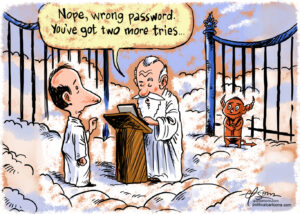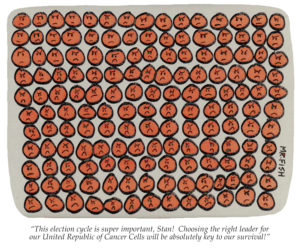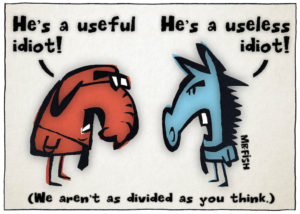‘Get Rich Cheating’
Truthdig is pleased to present an excerpt from comedian Jeff Kreisler's new book, "Get Rich Cheating," a satirical how-to guide that uses real scams in business, sports, entertainment, and politics to show how we got into the mess we're in.
Editor’s note:
Truthdig is pleased to present an excerpt from comedian Jeff Kreisler’s new book, “Get Rich Cheating,” a satirical how-to guide that uses real scams in business, sports, entertainment, and politics to show how we got into the mess we’re in.
Lest there be any confusion, please note that this is a work of satire intended for entertainment purposes only.
View the infomercial here.
“Get Rich Cheating” Excerpt 1:
Chapter 20 The Scam from U.N.C.L.E
I Want You! To Get His Money Once you have government connections and influence, you must use them—and abuse them. Now that you’ve convinced Uncle Sam to let you do whatever you want, it’s time to start doing whatever you want. These hard-earned contacts may only last until the next election, so get cheating.
Even George Bush knew about the fleeting nature of government hookups. He sucked every last penny he could out of his presidency, passing last-minute energy, environmental, and financial rules that benefited his buddies, even as a nation obsessed with campaign ’08 forgot he existed. If he can use the government to get rich, can the rest of us? Yes We Can.
“Win” Government Contracts
Government contacts will get you government contracts. In the alternate universe of $400 hammers, a government contract is a fountain of gold that never stops flowing. Good buddy Halliburton is the king of government deals, often no bid and high-pay. They’ve had about $18 billion in contract work in Iraq alone. How did they do it? Well, it probably helps that their former CEO is “your hero.” Even if you’re not that lucky, connections all along the contract process can help direct the work your way.
•Former Housing Secretary Alphonso Jackson steered hundreds of thousands to friends for work in post-Katrina New Orleans and the Virgin Islands. Um, it’s called vacation planning. •Ninety percent of the Small Business Administration’s budget in high-unemployment areas went to VBP Group, an Arizona company with zippo small business experience. The company was run by former Bush Agriculture appointee Vernon Parker. He got the contracts just four months after forming the group, even though it normally takes two years to get certified by the SBA, let alone receive money. •Moving Water Industries Corp. recently won a $32 million New Orleans drainage contract from the Army Corps of Engineers. The company’s bid matched up nicely with the specifications of the Army’s request for bids, which just happened to have been taken verbatim, typos and all, from the catalog of . . . ding! . . . Moving Water Industries Corp. Hey, it’s not their fault the Army can’t afford to hire competent employees. •New York State claims that investment firms paid friends and relatives of comptroller Alan Hevesi cash money in exchange for getting a pension management contract. And you thought a “comptroller” was what came with a Nintendo Wii.
No Bid, No Problem The really accomplished Great Cheaters can get their government contracts without even trying, through a process called no-bid. Spending on contracts awarded without “full and open” competition has tripled since 2000—and that doesn’t include the ’08 bailout. That’s a lotta cash to be cheated. Former Attorney General John Ashcroft got an eighteen-month, $52 million no-bid contract simply to monitor a legal settlement between the government and an Indiana medical supplier. No public notice, no bidding—the Justice Department just gave it to him.
The no-bid process is designed for speed and limits the ability of government crybabies to put up safeguards to prevent waste and fraud. Hey, they don’t have to worry. You’re not going to waste any of the money you fraud your way into.
The Best Defen$e Is a Good Offense You know who’s making nice money off the government? Honeywell, General Dynamics, United Technologies, and all the nicest defense contractors. The State Department spent about $4 billion per year on private security and law enforcement agencies alone from 2003 to 2007. The Coast Guard hired Lockheed Martin and Northrop Grumman to supervise a $17 billion modernization project. Sorta. DynCorp International got $1.1 billion to train police in Afghanistan. Well, they got their money, but there’s no trained police force. Hey, they say they’re on the job, so let’s just take their word for it. Defense contracting: Good work if you can shoot it.
In$piration: “Defense procurement has disintegrated into an incestuous relationship between the military, politicians, and contractors.” —Walter Braswell1
Our armed services don’t like paperwork; they like blowing things up. Michael Cantrell, a mid-level Defense Department guy, extracted $350 million from the Pentagon for projects it didn’t want and for services he never provided just by gaming the system. Army officials didn’t want to get in budget fights with Cantrell’s Senate friends like Trent Lott, so they just gave him contracts with no scrutiny. It was easier that way. Incest is best. Best of all, most of these war-related contracts are . . . drumroll, please . . . NO-BID!
“Even before the first shots were fired in Iraq, the Pentagon had secretly awarded Halliburton subsidiary Kellogg Brown & Root a two-year, no-bid contract to put out oil well figures and to handle other unspecified duties involving war damage to the country’s petroleum industry. It is worth up to $7 billion.2”
Companies like Bechtel, Halliburton, KBR, and Crest have connections to the government cash dispensers. Neil Bush—yes, another of the President’s brothers—helped get contracts for his friends. (The kind of friends who paid him about $60,000, i.e., good friends.) Shocking, I know. Cheating, you should.
Some hippies claim that the Iraq war has resulted in the “largest case of war profiteering in history.” Well, you have to account for inflation, liberal media. I mean, in 2008 dollars, the Peloponnesian War in 431 BC would have been, well, absurd.
“A BBC investigation estimates that around $23bn (£11.75bn) may have been lost, stolen or just not properly accounted for in Iraq . . . To date, no major US contractor faces trial for fraud or mismanagement in Iraq3. ”
There’s a multibillion-dollar Development Fund for Iraq paid for by oil revenue just begging for you to exploit it. Great Cheaters are reselling old equipment or submitting invoices for millions in salary without any documentation whatsoever . . . and getting it!4
I mean, come on, young cheater, do I have to spell it out for you? People are literally dying for you to get rich. You owe it to them to make sure their sacrifice is not in vain.
Charge Uncle Sam for work you’ve already done, you’ve done poorly, or you never intend to do. Meaninglessness has its price. Michael Cantrell got money for firms to test and design things they’d already tested and designed, prisons and detention centers are routinely built for way below their fee, and where did the money for that Bridge to Nowhere go? Nowhere, a.k.a. someone’s bank account.
Or just flat out overbill, baby. Do an hour of work,charge for a week. With all that bureaucracy, they’ll never catch on. Okay, Schering-Plough agreed to a $435 million settlement for overcharges and Halliburton’s always getting “cited” for excessive costs and Harry Sargeant III was accused of making $14 million by overcharging the Pentagon for fuel deliveries, but that’s just because some low-level pencil pushers don’t realize how much it costs to maintain a squad of highly trained junior executives to suck up to you at the snap of a finger.
Earmarks
Earmarks are an exciting way for your government connections to get you money. What’s an “earmark”? A tiny birthmark in the shape of a dollar sign on the ear of a giant who smashes others’ dreams. Despite grandstanding reform and veto pledges by the likes of several-million-in-earmarks-getting candidate John McCain, the spending bill for fiscal year 2008 included more than 2,200 earmarks worth $1 billion5, and that number is sure to increase because that’s what Thomas Jefferson would’ve wanted.
Not all the cash for these earmarks even makes it to where it’s ostensibly supposed to go6. Money gets lost along the pipeline. Why? Because Great Cheaters like you punch holes in the pipeline to siphon off barrels of sweet, sweet cash.
Those numbers are probably not accurate, because tracking the billions in earmarks is not-accidentally difficult to do. Whatever. There’s a lot of earmark money: Yes, there was a new ethics rule in 2007 about earmarks and pork barrel spending7, but that just made it more difficult to request money. Methinks congressional staffers can figure out how.
Rules, Schmules On the off chance that you can’t get around the rules, bend ’em, twist ’em, and change ’em. Legalize your schemes for cheating success.
In$piration: “If you set the rules . . . it’s almost impossible to lose.” —Karl Rove8
After repeatedly losing the state, the Republican Party tried to change the rules of the electoral college so that California’s votes in the presidential election would be distributed proportionally, not winner-take-all. Haven’t succeeded yet, but give ’em time. (Maybe they’ll bag that and just change the rules to allow an Ahnold to be president.)
After—and during—repeated losing, Hillary Clinton tried to change the rules regarding the counting of delegates in Michigan, Florida, and Texas during the ’08 Democratic primaries. All those states have strong college football traditions, i.e., a high tolerance for cheating. Coincidence? Probably.
Speaking of football, after repeatedly losing to the New England Patriots in the playoffs, the Indianapolis Colts whined their way into meeting with the rules committee to change the game. Peyton Manning benefited from the NFL’s subsequent greater emphasis on the illegal contact rule. He set records, won a championship, and made millions for himself, his team, and whoever produces the ten thousand commercials he’s in every goddamn day.
Let the Great Cheaters lead by example:
•GWB got installed as president when the Supreme Court decided to change its rules on federalism and equal protection, but just for that case, not for future decisions. It’s a “Get out of not being president for free” card. •W., just like every president, signed a zillion “midnight regulations” to give away what little government money was left without that annoying “I’m Just a Bill” song from Schoolhouse Rock. •The administrator of the EPA reversed a ruling allowing California to limit auto emissions after pressure from the White House. Well, duh, by the time the mutations kick in, we’ll all be long gone. Let California’s grandkids deal with the radioactive three-headed toads. •As his company neared catastrophe, Angelo Mozilo of Countrywide Financial changed the company’s rules to allow himself to sell hundreds of millions in stock. •During the height of the lending boom, the Office of the Comptroller of the Currency (OCC, not to be confused with OPP) invoked an obscure 1863 law to preempt all state predatory banking laws. No reason you can’t time travel to keep cheating. •The SEC voted against allowing investors to nominate their own board members, meaning folks getting screwed by us bigwigs can still do nothing about it. •Many states have adopted strict voter ID laws again. According to a judge in Indiana, his state’s law is a “not-too-thinly-veiled attempt to discourage election-day turnout by certain folks believed to skew Democratic.9” Nonsense. If you can’t correctly answer the simple, straightforward question “Are you a Republican?” you shouldn’t get to vote. •Missouri claims their voting ID laws exist to stop illegal immigrants from interrupting the voting process. Sure, because there’s nothing illegal immigrants like more than to go into government offices and ask to speak to someone in charge. Regulations, Schmegulations Remember when you were little and your friends came over to play and they’d get mad because you made up the rules as you went along because you were playing in your yard with your toys? Well, having influence over a regulatory regime is just like that. Only without Mom bugging you to play nice.
What’s the number one thing you want to have your regulatory regime do? Deregulate. Especially electricity. Deregulation led to Enron’s profits (and the California energy crisis, boo-hoo) and in Illinois it will probably generate a huge windfall for companies like Ameren and Exelon. MBNA and other credit card companies are huge campaign contributors. In the past thirty years or so, they’ve eliminated personal bankruptcy and had most of their questionable practices— like hidden fees, deceptive advertising, arbitrary high penalties, and usurious rates—legalized through deregulation.
You can use influence over regulators in other ways: •Ken Lay basically got to appoint all the members of Bush’s Energy Task Force, and, gosh darn, didn’t Enron make a boatload for a little while? •The Big Five accounting firms—with their $39 million-ish of political donations between 1989 and 2001—successfully prevented Arthur Levitt of the SEC from changing the accounting-auditing rules, which cheated them billions. •Why not just pass regulations that require you to get $1 million every five minutes? Why not?
The rule-making possibilities are endless: Red rover, red rover, send cheating right over. Simon says . . . cheat! No givebacks, no cooties—if I can’t have shotgun then I call “cheating”!
FOOTNOTES:
1. Eric Lipton, “Insider’s Projects Drained Missile-Defense Millions,” The New York Times, October 11, 2008.
2. Charlie Cray, “No Bid and No Problem,” TomPaine.com. http://www.tompaine .com/articles/no_bid_and_no_problem.php. There was more planning for the rebuilding contracts than for the rebuilding itself. Nice!
3. Jane Corbin, “BBC uncovers lost Iraq billions,” BBCNews.com. http://news.bbc.co.uk/2/hi/7444083.stm.
4. James Glanz, “Iraq Spending Ignored Rules, Pentagon Says,” The New York Times,May 23, 2008.
5. Ted Stevens got the most ($94.1 million) because Alaska has so many needy caribou.
6. Ron Nixon, “Not All Earmarks Are Paid in Full, and a Senator Wants to Know Why,” The New York Times, May 20, 2008.
7. “Pork barrel spending” is using a pig to lure monkeys out of a barrel in order to fill that barrel with ill-gotten booty. Less fun, but more rich.
8. Karl Rove, “How to Win in a Knife Fight,” Newsweek, April 7, 2008.
9. Jeffrey Toobin, “Fraud Alert,” The New Yorker, January 14, 2008.
“Get Rich Cheating” Excerpt 2 will be available next week.
Your support matters…Independent journalism is under threat and overshadowed by heavily funded mainstream media.
You can help level the playing field. Become a member.
Your tax-deductible contribution keeps us digging beneath the headlines to give you thought-provoking, investigative reporting and analysis that unearths what's really happening- without compromise.
Give today to support our courageous, independent journalists.




You need to be a supporter to comment.
There are currently no responses to this article.
Be the first to respond.